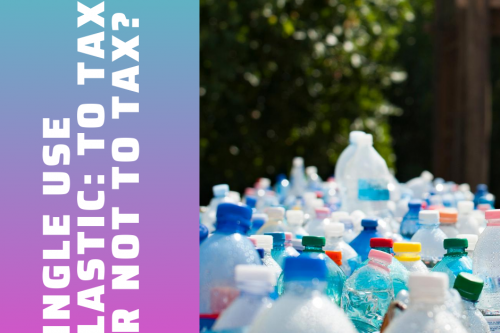Should governments tax plastic?
Reading Time:
2 minutes, 36 seconds
Should governments tax plastic?
Jumping Trout, LLC

(Wired AUG 2020) It's a known fact that single use plastics - like bags, food packaging, straws, etc. - are bad for the environment and our waste systems. So what should we do to make people stop using them? It's not easy to change systems (it's also expensive), but maybe if we tax bad behaviors, they'll cease to exist. I mean, look at what we did with tobacco - try getting a carton of cigarettes for under $6 - you can't, and you shouldn't, because they kill you.
States like California and countries like Sweden are ahead of the curve, taxing single use plastics and carbon (to encourage less carbon emissions). But how does this work, and will it work?
Basically, brands that produce and use single-use plastics will have to pay a penny for each non-recyclable or non-compostable piece of packaging they sell - bottles, chip bags, all that. In California, it's not just environmental people getting on board, the waste management compnay Recology filed paperwork to get the initiatve headed toward the California ballot and has contributed $3.7 million to the campaign.
By making it more expensive for food and personal care industries to produce plastics, they might use less or get rid of them altogether, meaning less trash in our oceans. If this law passes, the resulting revenue is estimated to be a few billion dollars each year. These extra funds would be used to shore up litter mitigiation efforts to provide subsidies to the recycling industry.
Single use plastics are so cheap to produce because of the low price of oil. If recycling gets a boost, more companies can turn the plastic that is out there into more recycled materials - but as of now, the recysling industry cannot compete with cheap plastic.
But will it help? Maybe. The concept of the plastic tax is similar to a carbon tax. With the latter, you put a price on carbon which will hit emissions-spewing utilities really hard. This will incentivize polluters to produce less carbon by swithcing to renewable energy. It also helps fund green energy projects or gets kicked back to local residents.
Even though they want to place the responsibility on the companies, there is some trickle down on the consumers. For example, in California if you're out shopping and don't have a reusable bag (which you can purchase anywhere), then you have to pay ten cents to use the plastic bag. Over time, that adds up - unless consumers just switch to paper, the producer of the plastic bags eats that cost.
So really, while these companies are being taxed for good, it's still up to us to make individual choices when shopping. There are so many options for reusable bags now that actually make it EASIER to grocery shop. However, with the current pandemic, many stores are not allowing people to bring their own bags into the store. So for now, try to opt for paper or take your plastic bags to a recycling center. I know Schnucks has one!
Source: https://www.wired.com/story/should-governments-slap-a-tax-on-plastic/
States like California and countries like Sweden are ahead of the curve, taxing single use plastics and carbon (to encourage less carbon emissions). But how does this work, and will it work?
Basically, brands that produce and use single-use plastics will have to pay a penny for each non-recyclable or non-compostable piece of packaging they sell - bottles, chip bags, all that. In California, it's not just environmental people getting on board, the waste management compnay Recology filed paperwork to get the initiatve headed toward the California ballot and has contributed $3.7 million to the campaign.
By making it more expensive for food and personal care industries to produce plastics, they might use less or get rid of them altogether, meaning less trash in our oceans. If this law passes, the resulting revenue is estimated to be a few billion dollars each year. These extra funds would be used to shore up litter mitigiation efforts to provide subsidies to the recycling industry.
Single use plastics are so cheap to produce because of the low price of oil. If recycling gets a boost, more companies can turn the plastic that is out there into more recycled materials - but as of now, the recysling industry cannot compete with cheap plastic.
But will it help? Maybe. The concept of the plastic tax is similar to a carbon tax. With the latter, you put a price on carbon which will hit emissions-spewing utilities really hard. This will incentivize polluters to produce less carbon by swithcing to renewable energy. It also helps fund green energy projects or gets kicked back to local residents.
Even though they want to place the responsibility on the companies, there is some trickle down on the consumers. For example, in California if you're out shopping and don't have a reusable bag (which you can purchase anywhere), then you have to pay ten cents to use the plastic bag. Over time, that adds up - unless consumers just switch to paper, the producer of the plastic bags eats that cost.
So really, while these companies are being taxed for good, it's still up to us to make individual choices when shopping. There are so many options for reusable bags now that actually make it EASIER to grocery shop. However, with the current pandemic, many stores are not allowing people to bring their own bags into the store. So for now, try to opt for paper or take your plastic bags to a recycling center. I know Schnucks has one!
Source: https://www.wired.com/story/should-governments-slap-a-tax-on-plastic/
Posted In:

